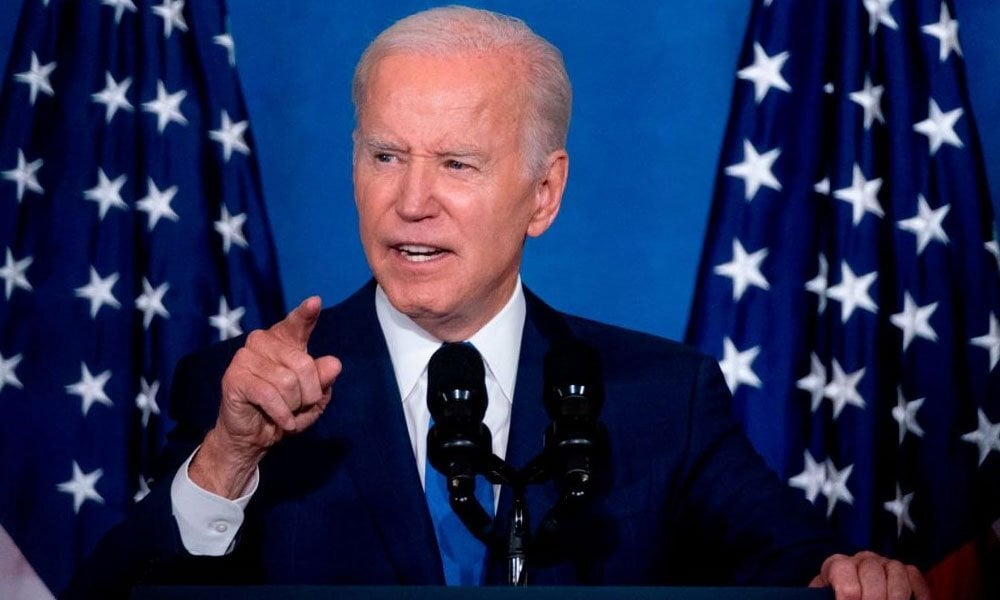“(With) today’s Supreme Court decision on presidential immunity, that fundamentally changed. For all practical purposes, there are virtually no limits on what the president can do. It’s a fundamentally new principle and it’s a dangerous precedent because the power of the office will no longer be constrained by the law even including the supreme court of the United States.”
Throughout his address, Biden underscored the gravity of the moment, emphasizing that the only barrier to the president’s authority now lies in the personal restraint of the officeholder. He warned vehemently against the prospect of Trump returning to power, painting a stark picture of the dangers such an outcome could pose.



So, obviously he could just [redacted] the supreme court justices he doesn’t like, appoint new ones, and then the only thing congress could do would be to expand the court or whatever, right? but then why couldn’t he also just keep killing people in official acts until he gets a bunch of people that are like “yup, that was official and you don’t need to do anything about it”? I know that’s probably a slippery slope, right and would probably get him a shit ton of public pushback, especially after a certain point, from both conservatives, who predominantly make up the military, and economic power structures, to liberals who would prize decorum and “fair play” above all else (but I repeat myself), and so maybe that leads to a dissolution of society, which maybe leads to an even worse society as the people who control the levers of power are already the most horrible people, but, yadda yadda.
But, I dunno, how many congress people does he have to make go away, before the rest of them start to get the picture and then start to behave in their own self-interest, as they’ve always behaved? How many people do you really have to threaten in a system where the people who climb to the top are only going to be there out of their own extreme self-interest?
Isn’t that the definition of a fascistic dictator?
Not so much, it would more be along the lines of a standard military coup, which doesn’t necessarily have to originate from a fascist. Those can and do come from all sides of the political spectrum.
I don’t think biden would ever do that, and probably if he did, he’d be the worst president dictator of all time with only the mild upside that he could maybe only do so for the rest of his probably not long lifespan, or for the next couple months as they run another election, which he would probably do since he seems like kind of a sap.
But, if he were replaced by a person I actually liked, or there was someone who’s policy I agreed with in that position, I’d pretty much be fine with it, and I get the feeling that most people would be fine with it too, as in, a majority of the population. The levers of power might freak out though, and that might put a damper on things.
So you’re ignoring this part of fascism? “forcible suppression of opposition”
Well yeah, but that’s only one part of fascism. You could say pretty much the same of any war, lots of non-fascist goverments, and hell, you could say we already do that, just look at how the campus protests were treated, the BLM protests, the civil rights protests, the sufferagettes, a personal favorite of mine would be the horrid history of our oppression of labor by siding with companies and enabling the use of pinkertons to gun down crowds, yadda yadda.
No, if america was to be fascist, it would be fascist for historical reasons which already existed, which have been around for a while already. I don’t know whether or not america suddenly having a dictator, would really have too much of an effect on it suddenly becoming fascist, despite the popular consensus that fascism just requires a really racist guy to suddenly be a dictator. I actually don’t think that would factor too much into the definition at all, I think you could pretty easily have a fascist democracy, and you could definitely have a fascist oligarchy.
I’m pretty sure imperial japan was mostly run by a military cabinet which internally needed a certain number of votes, and the emperor was more like a figurehead and religious figure that had a certain amount of sway over the cabinet’s decisions as he was like, a big deal, more than him being a figure of political power. From what I remember, anyways. Me personally, I’d be pretty comfortable calling imperial japan a fascist state, even if it maybe conforms to that definition less well than, say, italy or germany.
that isn’t part of how mussolini defined it.